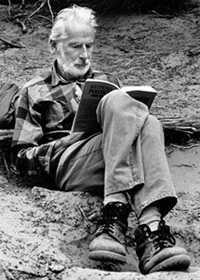Ecofascism: Deep Ecology and Right-Wing Co-optation
- Ayrıntılar
- Kategori: Deep Ecology
Ecofascism: Deep Ecology
and Right-Wing Co-optation
by Kev Smith, Greenpepper
Alongside the rise of environmental activism in the last few decades, nationalist and even fascist ideas are gaining an increasingly high profile in Europe. With social tensions exacerbated, neo-fascist groups of various kinds are winning electoral representation and committing acts of violence against foreigners.
To a casual observer, there would seem to be a vast gulf in ideology and outlook between the new right and environmental activism. But these movements are invoking ecological themes to update their ideology and now speak the new language of ecology. In ways that are similar to the beliefs of progressive-minded ecologists, fascist groups emphasize the supremacy of the Earth over people and evoke "feelings" and intuition at the expense of reason.
This is an extremely sensitive issue among activists. To accuse an individual or a philosophy of racist tendencies is always going to cause offense. Much-needed debate has been poisoned by wild mud-slinging and sensationalist accusations of eco-fascism. In this article, I don't want to point the condemnatory finger at groups or individuals and ignite a McCarthyist witch-hunt. Rather, I want to illustrate how the nature and content of certain belief structures within the environmental movement make it easier for new-right groups to reach a wider audience. I will discuss this in the context of Deep Ecology as it has been one of the most widely debated and has parallels with 1930s Germany.
…many environmental groups …still rate population growth over the systematic over-consumption of the industrialized world.






 A philosophy is, among other things, a system of thought that governs conduct. But in the original Greek it meant "love of wisdom" - and we need all the wisdom we can get to face the implications of global climate change. Several new philosophies have developed in response to the worsening environmental crisis, and among the most interesting is something called "deep ecology." It calls for nothing less than a complete overhaul of the way humans live on the Earth.
A philosophy is, among other things, a system of thought that governs conduct. But in the original Greek it meant "love of wisdom" - and we need all the wisdom we can get to face the implications of global climate change. Several new philosophies have developed in response to the worsening environmental crisis, and among the most interesting is something called "deep ecology." It calls for nothing less than a complete overhaul of the way humans live on the Earth.




